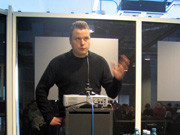THE OBSCURANTISM OF FACTS LECTURE: REGIMES OF REPRESENTATION: ART & POLITICS BEYOND THE HOUSE OF PEOPLE CONFERENCE AT THE NATIONAL MUSEUM OF CONTEMPORARY ART, BUCHAREST 11 JANUARY 2007

Neither philosophy nor art are matters of proof or opinion. Philosophy and art posit things, they assert. Assertion is distinguished from proof and opinion since it has to make do without certainty. A philosophy of assertion is a philosophy in uncertainty. It surpasses and transgresses the modalities of conventional thinking such as reflection, argument, grounding, and criticism. It is a matter of the subject touching a truth in uncertainty and giving this instance of contact a form, a language. Truth refers to the limits of the world of facts. Philosophy exists only in that it touches these limits. It is an assertion that denies the validity of the imperatives of the factual. Touching upon truth, philosophy has to resist the certainty of opinion and the obscurantism of facts in equal measure. It is a touching of the untouchable and it makes this touching into a life-form.
My aim is to defend the political relevance of art and philosophy against conventional political art and political philosophy. I intend to show that political art and political philosophy establish their own de-politicization. They are not concerned with a politics of freedom, of the impossible and what is most necessary. The politics I am referring to differ from what is usually called politics. This type of politics does not assert or defend interests. It would be about a resistance against the order of socio-political and ideo-cultural reality. It would articulate itself by absolutely refusing the universe of facts and the opinions circulating in this universe. It would be a politics of truth insofar as it considers proof as what comes into conflict with established certainties. It causes the voice of official truth to stutter and be brought to silence.
I want to show that art only has meaning as art. Philosophy only has meaning as philosophy. It does not serve to reduce art and philosophy to the socio-political field in which they articulate themselves. It does not make sense to define the mission of art and philosophy as political. 'That is the left-wing illusion of the past few decades,' Heiner Müller argues 'of European intellectuals and particularly the literati, that there could be and should be a community of interests between art and politics. Ultimately, art cannot be controlled. Or it can always evade control. And for this reason it has been... almost automatically subversive.'
